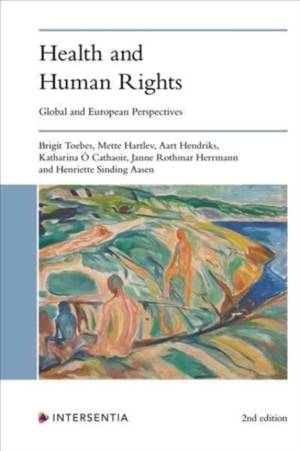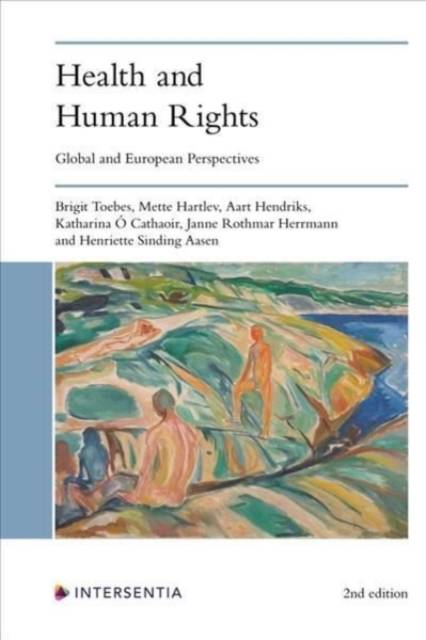
- Retrait gratuit dans votre magasin Club
- 7.000.000 titres dans notre catalogue
- Payer en toute sécurité
- Toujours un magasin près de chez vous
- Retrait gratuit dans votre magasin Club
- 7.000.000 titres dans notre catalogue
- Payer en toute sécurité
- Toujours un magasin près de chez vous
Health and Human Rights, 2nd Edition
Global and European Perspectives
Brigit Toebes, Mette Hartlev, Aart Hendriks, Katharina O Cathaoir, Janne Rothmar Herrmann, Henriette Sinding Aasen
Livre broché | Anglais
131,45 €
+ 262 points
Description
'Health and human rights' is an important dimension of international and European human rights and health law. It is multi-disciplinary, engaging scholars and practitioners of public health and medicine, as well as legal scholars and human rights lawyers. Taking a 'health and human rights approach' means applying international, regional and domestic human rights law to a wide range of health-related issues.
Human rights law informs other areas of law that engage with health issues, including international and domestic health law, biolaw and bioethics, patients' rights, and environmental law. It brings a new, and often more international, as well as a moral dimension to existing legal analyses of health issues. This is essential in an increasingly interconnected and globalised world, where health concerns are omnipresent and can no longer be addressed solely at a domestic level. This book focuses on the legal interfaces between 'health' and 'human rights', taking both a global as well as a European approach. Globally, there are tremendous challenges when it comes to the protection of collective and individual health. Such challenges include weak (primary) healthcare systems, the spread of infectious diseases, such as COVID-19, and the increase of noncommunicable diseases (NCDs), as well as the health effects of air pollution and climate change. In such settings, human rights can, potentially, play an important role in protecting the rights of vulnerable individuals. It is a compelling framework for assessing these and other questions in the health field, as it couples health-related problems with a legal and moral dimension. The international recognition and definition of the 'right to health' is at the centre of this, but there are many other relevant human rights standards, including the right to life, the right to respect for privacy and family life, and the right to have access to information. International case law in the health field has made its mark when it comes to matters like access to health services, abortion, and inhuman and degrading treatment in health settings. Increasingly, links are being sought between human rights and other international standards protecting health, in particular the standards adopted by the World Health Organization (WHO). The European context is, to some extent, a region sui generis, not only in terms of health issues and health outcomes, but also from a political and legal perspective. The authoritative case law of the European Court of Human Rights (ECtHR) of the Council of Europe has increasingly touched upon health-related issues. Health and Human Rights brings together contributions from human rights and health law experts from three different countries in Northern Europe. Together, the chapters give a rich account of the legal and interdisciplinary aspects and perspectives related to 'health and human rights'. This book is of interest to lecturers, students, practitioners and law- and policymakers and offers up-to-date analyses of crucial human rights issues in modern healthcare, practices and regulations in Europe and beyond. BRIGIT TOEBES is Professor of Health Law in a Global Context at the University of Groningen, the Netherlands. METTE HARTLEV is Professor of Health Law at the University of Copenhagen, Denmark. AART HENDRIKS is Professor of Health Law at Leiden University Medical Centre (LUMC), the Netherlands. KATHARINA Ó CATHAOIR is Associate Professor of Law at the University of Copenhagen, Denmark. JANNE ROTHMAR HERRMANN is Professor with special responsibilities in health law and technology at the University of Copenhagen, Denmark. HENRIETTE SINDING AASEN is Professor of Law at the University of Bergen, Norway.Spécifications
Parties prenantes
- Auteur(s) :
- Editeur:
Contenu
- Nombre de pages :
- 408
- Langue:
- Anglais
Caractéristiques
- EAN:
- 9781839700576
- Date de parution :
- 18-04-22
- Format:
- Livre broché
- Format numérique:
- Trade paperback (VS)
- Dimensions :
- 160 mm x 240 mm
- Poids :
- 766 g







